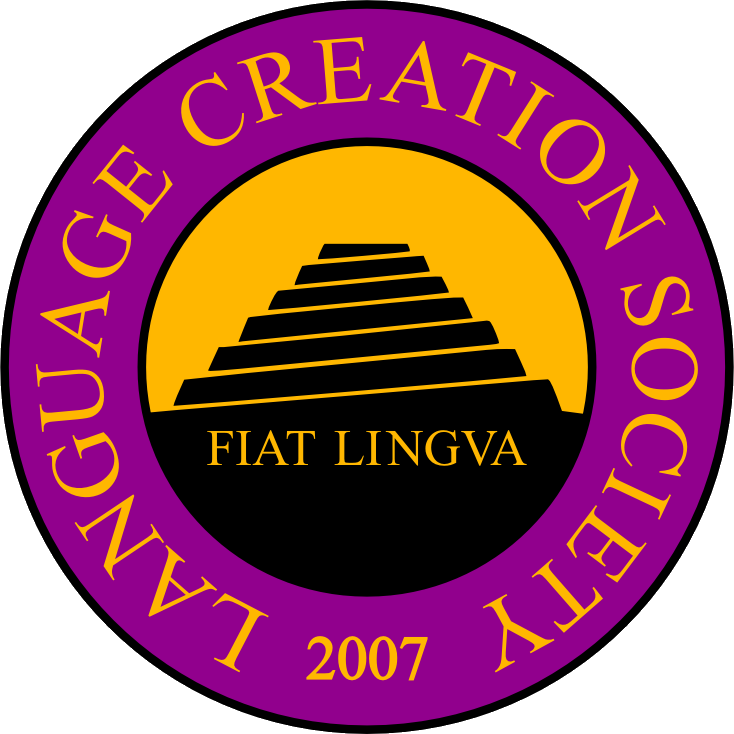Language Creation Tribune
Issue 5
May 2015
A word from our President
Welcome to the 5th edition of the Language Creation Tribune! A little late again, but we are all in the afterglow of the LCC6, so I hope you’ll excuse us. Why, of course, I am going to talk about the 6th Language Creation Conference. What did you expect?
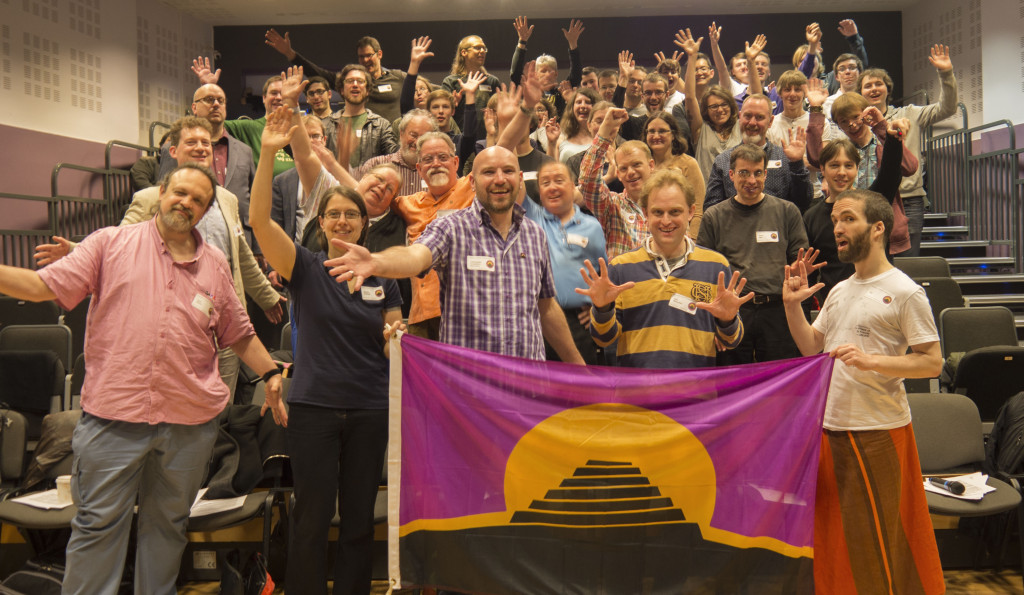
Before I talk about my personal experience of the LCC6, let me once again give special thanks to the people who made it a reality, and ensured it was such a fun and successful event:
- Thanks to our local host Pete Bleackley, for organising this wonderful event;
- Thanks to Sai and Alex Fink, for working very hard at getting the fickle live-streaming technology working, so even people who couldn’t attend live would be able to attend it remotely;
- Thanks to the people of the Horsham Capitol Arts Centre for providing us with such a great venue;
- Thanks to Sylvia Sotomayor, who worked really hard in the background to get everything ready, from the LCC6 website to the lunch and coffee breaks, and made my job so much easier;
- Thanks to Erin Peterson, who took over front of house so that Sylvia could enjoy the LCC itself with the rest of us;
- Thanks to the speakers, for all the fun, informative and interesting talks they gave us;
- Thanks to everyone who participated in both rings of the LCC6 conlang relay, and special thanks to Jessie Sams, our very own editor-in-chief, for organising it so masterfully;
- Thanks to everyone who attended in person! Some of you travelled from very far, and you’ve helped make this LCC the best attended one so far (with 55 people present at once in the venue);
- And finally, thanks to everyone who attended on line as well! You’re also part of the success of the LCC!
As you all know, the first time I came in contact with the Language Creation Society was when David Peterson, then President of the LCS, asked me whether I’d be interested in being the local host for the 4th Language Creation Conference. This request is what resulted in the series of events that put me in the position I hold today, so the LCC holds a special place in my heart. It’s no surprise that I met the prospect of the first LCC under my presidency with both excitement and apprehension. And to tell you the truth, to me the LCC6 felt like the first true test of my abilities: I was afraid at the idea of having to lead it (you can ask David about that!). And even worse, I was terrified that my lack of experience would hinder other people’s efforts to make the LCC6 a successful event. Luckily, everyone was very understanding (especially Sylvia—I wouldn’t have managed if it wasn’t for her advice and her patience!), and it seems my attempts at playing Master of Ceremony were not altogether unsuccessful (or at least the audience was very understanding!). So it seems I passed this milestone, and this makes me feel both relieved and elated. I’ve received great feedback, I enjoyed myself immensely, and I finally got to meet a lot of people in real life that I have known for a long time only through words on a computer screen. The feelings associated with such an experience make all the anxiety beforehand more than worth it!
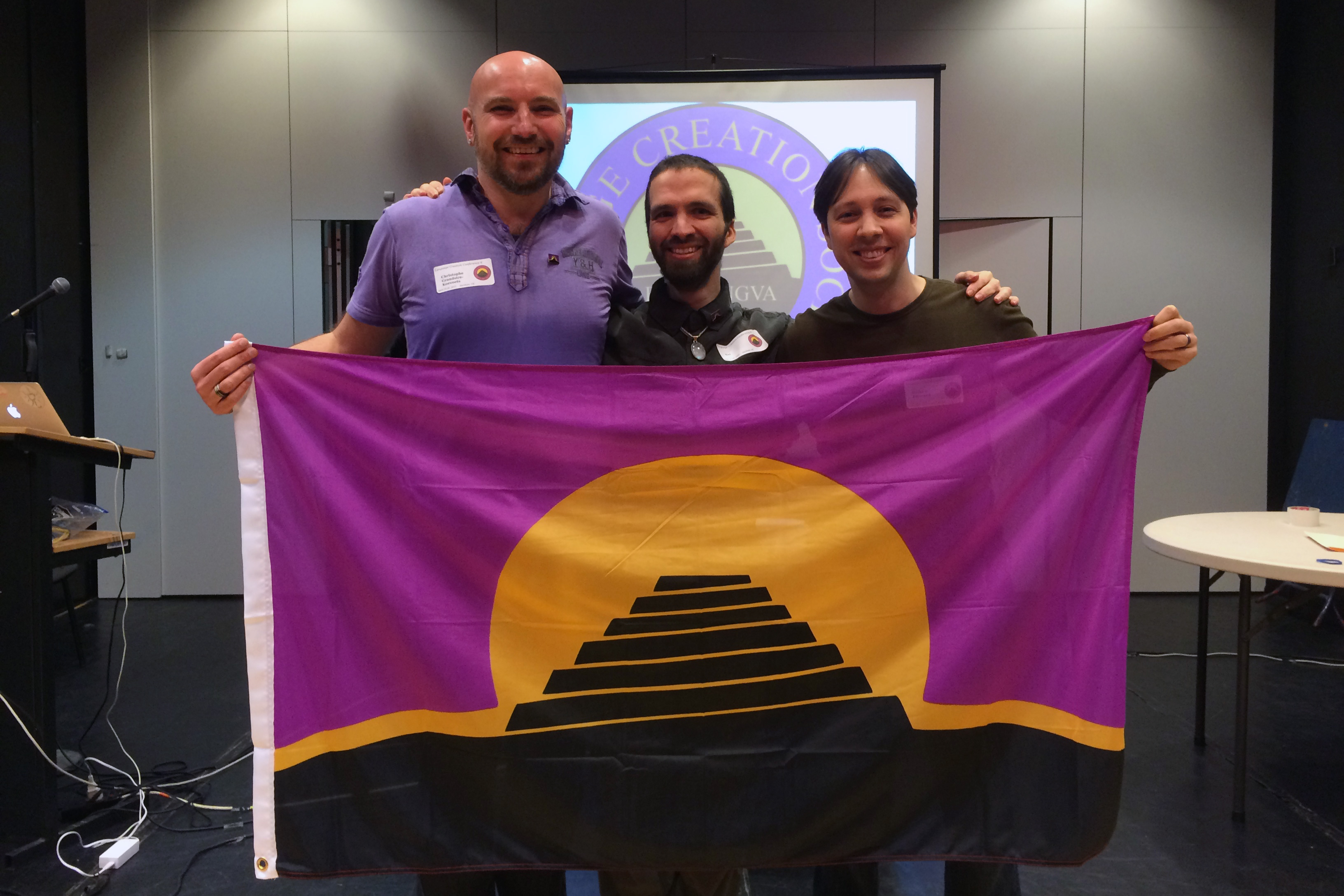
All three presidents of the LCS , together for the first time!
However exhausting the preparations were, the success of the LCC6 made me again aware of the important role we have in the LCS in serving the conlanging community, and it’s with renewed energy that I get ready to serve you all again to the best of my abilities. Thanks again for your trust, and I hope to be able to help even more in the future!
Fiat Lingua!
Christophe Grandsire-Koevoets,
President of the Language Creation Society.
Conlang Curiosities
by John Quijada
Layin’ Back With the Leyen
At the recent Sixth Language Creation Conference in Horsham, England, I had the distinct pleasure of meeting LCS member and conference host Peter Bleackley. For a laid-back Californian like me, meeting such an authentically English (and brilliantly eccentric) gentleman like Peter is a rare treat – whether we’re discussing conlangs or sharing a beer at the pub (which we did!).
At any rate, Peter is a long-time participant on the Conlang mailing list, and his Khangaþyagon conlang is well-known to Conlang-L members. Lesser known is his more experimental iljena language, spoken by the Leyen on a world orbiting the star Delta Pavonis. Peter gave an interesting presentation at LCC6 called “When Is Case Not a Case?” showcasing both of his conlangs, but it was the portion of his talk dealing with iljena that really piqued my curiosity. A truly different, fascinating conlang worth examining beyond the tidbits offered at LCC6.
iljena holds no surprises in the phonology department, but when it comes to morphology and syntax, one might argue that iljena is the greatest language ever invented for the purposes of poetry. Why might that be? In iljena, Pete has found a way to truly merge the concept of noun and verb into one holistic unit that paints what I think of as a little “action-image”. An iljena word consists of a tri-literal consonant pattern (à la Semitic languages) which conveys the nominal portion of the word, while the vowel pattern interfixed among the consonants carries the verbal portion of the word. Each of these little action-image units is then placed together sequentially (a simple syntax that Pete calls “clause-chaining”) to create a “flow” of action-images corresponding to sentences in other languages.
As a lovely example, we can take the noun pattern h-w-m “she/he” and merge it with the verb pattern eCaCC “travel”, then merge s-f-k “boat” with CoCCa “carry”, and follow this with the patterns m-r-j “sea” plus CeCaCi “separate” to create a “sentence” ehawm sofka meraji – literally “he/travel boat/carry sea/separate”, translatable as She/he travelled across the sea.
Another example:
ewtag kvis mohn
student/have raven/perch hand/hold
The student’s raven perches on his hand.
As can be inferred from the above, all iljena words are monovalent; there are no subjects or objects, as everything is a participant in the action-image. Morphological elements such as tense or mood are conveyed periphrastically as yet another action-image. The use of certain verb components in a word sometimes correspond to concepts like case in human languages, e.g., use of the component meaning “hold” to convey a locative sense, or “undergo” to convey a word’s role as an accusative object. However, humans learning iljena often overuse these patterns in an attempt to force the noun component of an iljena word into human-language semantic roles. Indeed, while researching this article, I surprised myself by discovering that I once actually translated from iljena way back in Conlang Relay No. 16, and according to Pete’s instructions to me at the time: “Humans learning iljena often find it difficult to choose appropriate vowels for the participant that they regard as the object, while Leyen learning human languages have difficulty with the idea of separating objects from their actions. As The Essential Guide to Alien Languages puts it, ‘Morphologically, iljena is essentially a Semitic language turned up to 11. Syntactically, it is essentially a slightly exaggerated version of Mandarin.’”
The Leyen themselves refer to the nominal component of an iljena word as its “body” and the verbal component as its “spirit.” It is the union of the two that gives life to a word. Consequently, Leyen grammarians consider words from human languages to be “like corpses and ghosts”, given that nouns (“bodies”) and verbs (“spirits”) never combine together to come alive. You know, I’ve read a lot of con-cultural ideas in my time, whether in sci-fi novels or descriptions of con-worlds, but that has got to be one of the coolest (and thought-provoking) exo-viewpoints on humans I’ve ever read.
Another cool aspect about iljena is the fact that Pete sought out fellow LCS member Sylvia Sotomayor, asking her if he could incorporate elements of her Kēleni con-world into his own, to which Sylvia agreed. As a result, both Leyen and Kēleni explorers have interacted with each other and commented on each other’s languages (to quite curious effect, given the verbless nature of Kēlen).
Last but not least, Pete provides a wonderful Whorfian explanation for the nature of iljena grammar: the skin of the Leyen are covered with vibrissae, somewhat like cat whiskers an inch apart from one another, “which make them highly sensitive to air movements. This sense is very important to them, and gives them a sense of being fully immersed in an active world.”
One of the reasons I wanted to showcase iljena is because the online resources about it are so sparse (a minimal Frathwiki entry, a few relay texts, and one short parable). A language so subjectively expressive, so naturally poetic, yet so simple in its grammar deserves to be better-known.
I will leave you with an iljena sentence that every conlanger can use to describe him- or herself:
wolm himwa hwima ahiwem
“all time”/hold (s)he/wish (s)he/make (s)he/learn
He/she always wished to be making and learning.
Member Milestones
May 19, 2015, marked the 25th anniversary of the marriage of John Clifford and Martha Baker. John is an LCS Board member and a quondam epigone of Loglan, Lojban, aUI, toki pona, and dama dewan. Martha doesn’t mind much.
On May 23, Alex Sands, local host of LCC5 in Austin, Texas, graduated summa cum laude from the University of Texas at Austin School of Social Work, earning his Bachelor’s in Social Work. He was also included in the very short list of Distinguished College Scholars. Congratulations, Alex!
David and Erin Peterson are expecting their first child in early December! Congratulations to both of you!
David Peterson’s latest book, The Art of Language Invention, has a set publication date of September 29 and is now available for pre-order on the Penguin Books website.
Medicine for the Dead, the second novel in Arianne ‘Tex’ Thompson’s “Children of the Drought” fantasy trilogy, was published in March 2015. Jason Wells-Jensen is a language consultant for the series, which is set in a multicultural world reminiscent of the American Southwest. The setting and languages are discussed in this interview about the first book, One Night in Sixes:
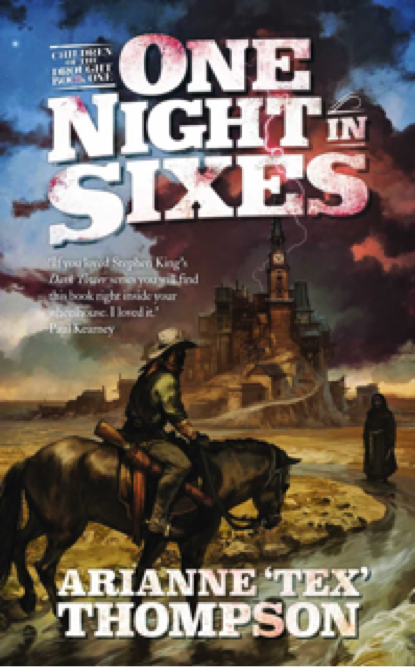
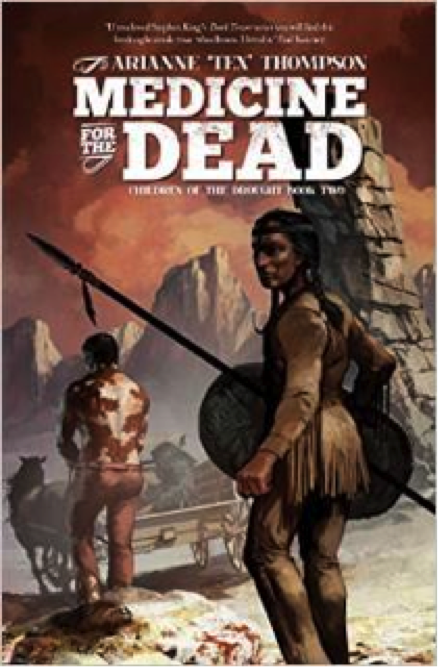
Conlanging News
News on classes, talks, conventions and articles relevant to conlanging:
- You can access the live streaming videos of LCC6 on the LCS YouTube channel.
- The Indy PopCon will be held June 26-28; PopCon is touted as being created “for the fans, by the fans” and covers a variety of genres.
- Worldcon 2015 is coming to Spokane, Washington, in August 2015. One of the guests of honor is astronaut Dr. Kjell Lindgren, who will be participating from the International Space Station.
- You can keep up with an ongoing list of current Sci-Fi conventions at UpcomingCons.com.
News of media and websites relevant to conlanging:
- Season 3 of Defiance, featuring four conlangs (Irathient, Castithan, Indojisnen, and a new one), premieres in America on June 12th at 8/7 Central on Syfy.
- Season 2 of Dominion, featuring the conlang Lishepus, premieres in America on July 9th at 10/9 Central on Syfy.
- May is ReCoLangMo (Redditt Conlang Month), which is divided into seven sessions for constructing a language in a month. You can check out the schedule and information here.
- Deconstructed Construction on Tumblr took a break from posting over the past year but is beginning to post again; they provide some good conlanging resources and information.
News specific to LCS:
- You shop. Amazon gives. If you shop Amazon, you can now support the LCS by using this Amazon link for your shopping. Amazon will give a percentage of its profits on all the purchases you make through that link to the LCS.
LCS Membership benefits
You can find more information about becoming a member, as well as more information on the benefits, here.
- Two permanent yournamehere.conlang.org domain names and free full web and email hosting; for more information or to fill out the form to claim a domain name, please visit this page.
- Checkout privileges for the LCS Lending Library.
- Access to a Hightail account (you can find more information about Hightail, an online file server, at its website); please email Sylvia to create your account.
- Full voting rights in the LCS.
- Discounts on all LCS events.
Please direct any questions you have regarding LCS membership to memberships@nullconlang.org. Also, all communication regarding your membership will come from that address as well, so please white-list memberships@nullconlang.org.
